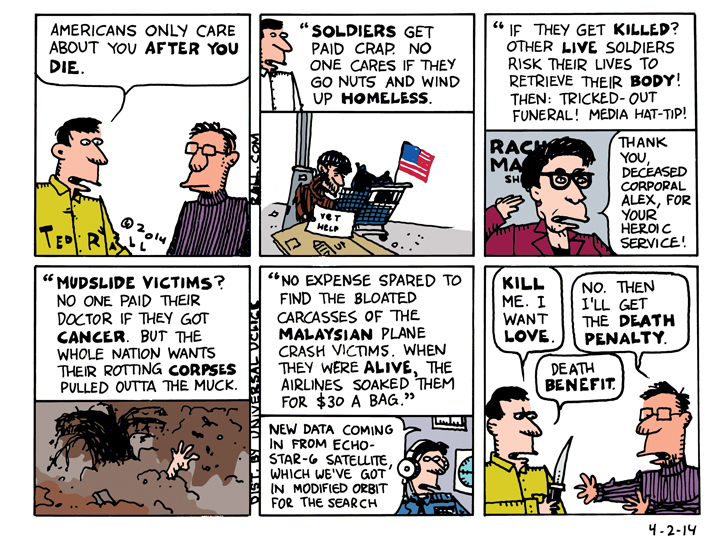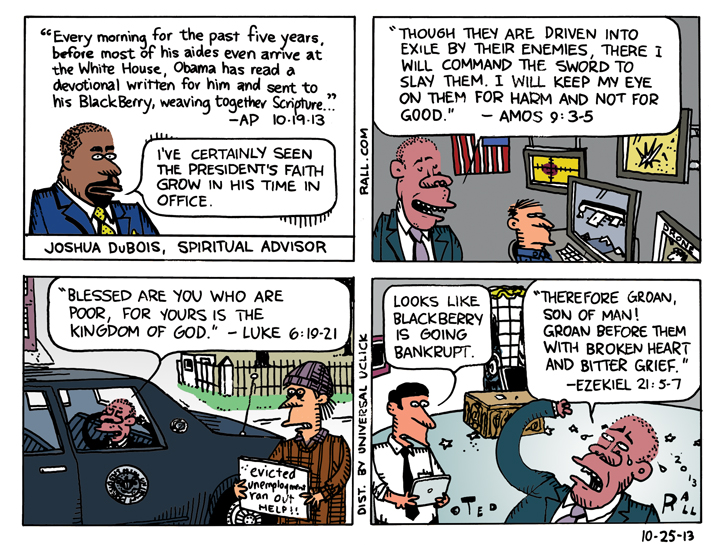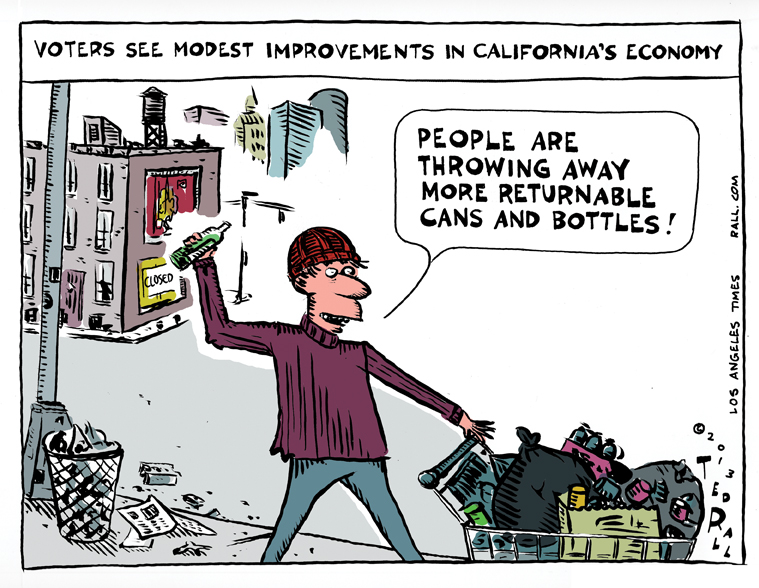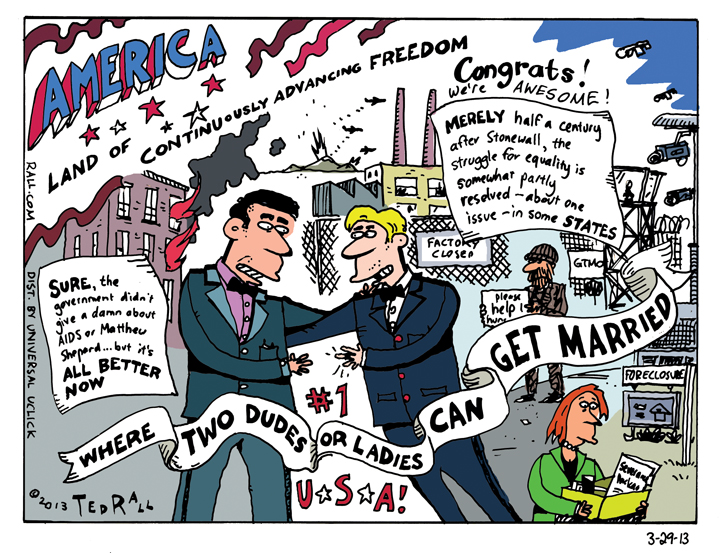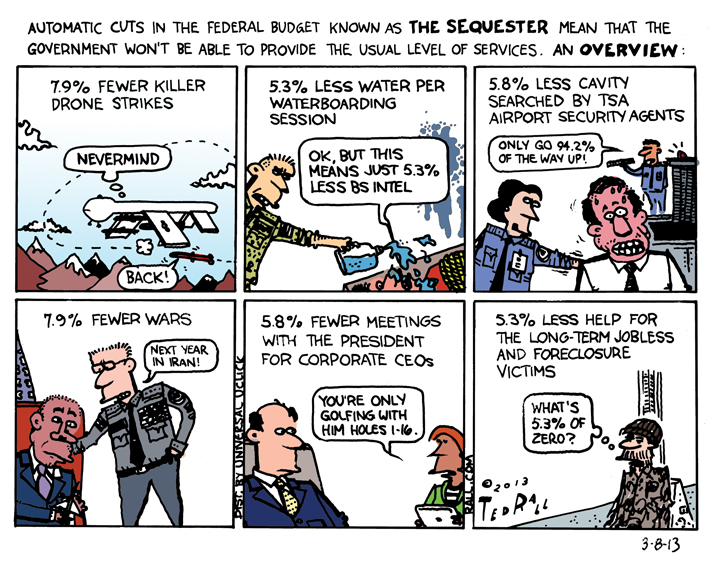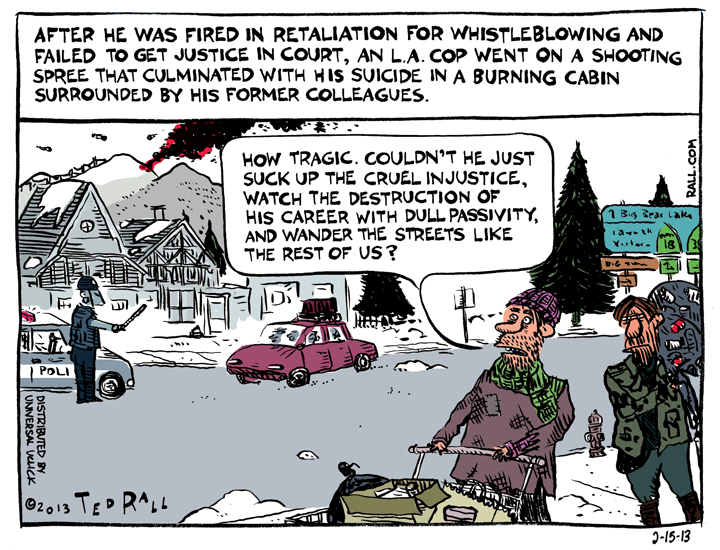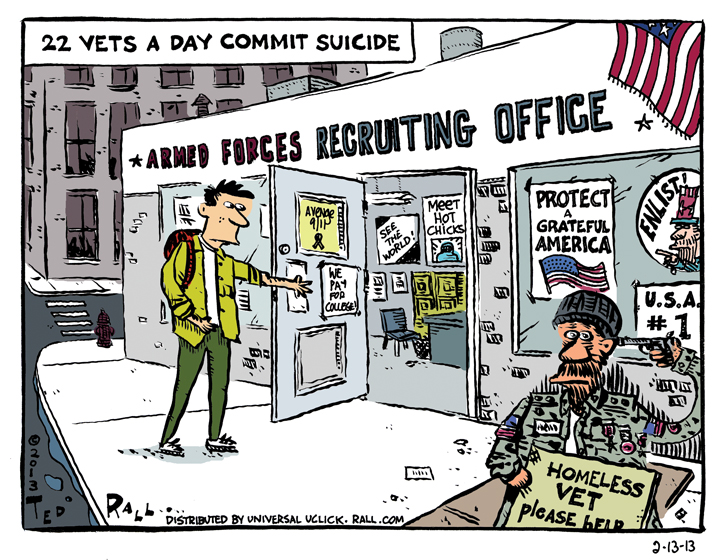No expense is spared to retrieve dead bodies, whether it’s the victims of the Malaysian Flight 370 victims at the bottom of the Indian Ocean or the mudslide victims buried by sludge in coastal Washington State or the soldiers who cannot be left behind on the field of battle. Yet when we’re ALIVE, we can’t get help when, for example, we lose our jobs.
LOS ANGELES TIMES CARTOON: Modest Improvement
I draw cartoons for The Los Angeles Times about issues related to California and the Southland (metro Los Angeles).
This week: Voters see modest improvements in California’s economy.
On Jealousy
Doesn’t matter if they deserve it: criticizing the work of a creative person who isn’t successful is mean. Not to mention pointless. If they’re not doing well, and their work sucks, the system is working.
Take on a cartoonist or writer who is raking in the cash, on the other hand, and his fans will accuse you of sour grapes. “You’re just jealous!” they’ll say.
Which is true, but also not true.
I’ll start with the not-true part.
I’ll focus on cartoonists because that’s my chosen profession, and I happen to think I’m good at it, and I sometimes issue broadsides against cartoons I think are such an insult to my profession that their shitsmeariness literally takes money out of my pocket merely by toiling in the same genre.
Lots of cartoonists make more money than I do. Yet you won’t find me tearing them a new critical asshole. Matt Groening makes more money than he can count. Is he perfect? Hell no. But as far as I can tell, he deserves every cent. Charles Schulz, Gary Larsen, Garry Trudeau, Bill Mauldin, James Thurber — all cartoonists who made or make bank. Schulz still makes tens of millions a year, and he’s dead. All got more awards than I could dream of. As far as I’m concerned, the system worked in these cases.
If my criticisms of other cartoonists were motivated by simple sour grapes, by the simple equation of he-has-more-good-stuff-than-I-do, I would attack the most successful, richest cartoonists the most. Or I’d draw a line at my level of income and fame, and grouse about everyone above it. Of course, this would delegitimize my complaints.
Some of the cartoonists whose work I criticize respond by saying that my work sucks. In other words, I don’t have standing to attack them. Which, if true, is silly: you don’t have to be a (rich) film director to have a (valid) opinion on a movie. Then they fall back on the sour-grapes argument: I’m jealous of their talent.
Indeed, I am jealous of other cartoonists’ talent. I wish I drew as well as Matt Bors, wrote as brilliantly as Ruben Bolling, had as much passion as Stephanie McMillan, as much control as Jen Sorensen, as much crossover appeal as Shannon Wheeler, as much consistency as Tom Tomorrow. None of whom, by the way, make more money or have earned more awards than I have. Which, for me, is evidence that the system is not working. They should make more money and win more awards — not than me, goddammit! — than the hacks whose crap I ridicule.
Am I jealous? Damn right, I’m jealous.
I’m jealous when people get stuff they don’t deserve.
Tom Friedman, the New York Times columnist, is one of the worst published writers in an American newspaper, an insult to logical reasoning, and more damning of all, deadly wrong about major issues. His job is to prognosticate, yet he has no ability to see past his bushy porn-star mustache. He was, for example, in favor of invading Iraq because he thought the U.S. would do a good job there. He was wrong when a lot of other people were right. He was listened to. They weren’t. And the consequences were devastating. Friedman lives in a palace. Does he deserve it? Hell no. Do I deserve it? More than him, that’s for sure.
I recently applied to a minor cartooning contest called “Best of the West.” It’s for political cartoons that run in the Western United States. Since I do cartoons for The Los Angeles Times, I applied. When the results came out, I was disgusted. This is because (a) it turned out the judge for the contest is close friends with the first-prize winner. They’re co-hosting the editorial cartoonists’ annual convention in three months. Talk about conflict of interest. I was jealousgusted (new word! use it, spread it around) by (b) by no objective standard could the first- or second-prize winners of Best of the West be judged to have done better cartoons than me or, say, Jen Sorensen, who also applied. Jen’s worst-ever cartoon is better/smarter/more political than number one or number two’s best-ever cartoon. So is mine. It’s not even close. We wuz robbed. So were others, including third-place “winner” Matt Bors. No one with eyes would put number two — who the same week published an “editorial cartoon” that, if I were on a prize committee, would have by itself have disqualified him from consideration — above Matt Bors in an editorial cartooning contest.
I bring up “Best of the West” because it literally means nothing. Well, maybe 0.02% of nothing. No prize money. No acclaim. The only reason I applied was that it’s been years since I won any prize whatsoever, and in a tough environment even 0.02% acclaim might be worth having. So just to be clear: I’m jealous. Not of Matt Bors, who got screwed as much as I did, well, slightly less, but still. I’m jealous of numbers one and two, who hold jobs, with full benefits, while I don’t. And I’m angry at the judge, because he knew — or should have known — that he made a shitty decision, and one devoid of basic ethics to boot.
Now several of my colleagues have taken me to task for talking about how certain hack cartoonists have staff jobs, with medical benefits, while I don’t. This, they tell me, makes me look petty.
Well, shit.
If the homeless veteran on the street outside the Starbucks where I am writing this sees me typing this on my shiny $3000 laptop, a $2.40 coffee cooling at my side, $650 glasses perched on my nose, is he jealous? Well, he should be. I don’t blame him if he comes in here and beats me to death. The gap between what I have and what he doesn’t have is so huge that he would literally have to be stupid and crazy not to hate me. I don’t deserve what I have, not compared to him. I don’t deserve to be the beneficiary of that gap.
Now let’s take a detour down Theoretical Lane: Imagine that — and that this is somehow provable — that by objective standards, he has led a better life than me. That he has worked harder, made better choices, been nicer, more creative, etc. Let’s further imagine that he and I both know this fact. Does he have a right to be jealous? Damn right he does. Would it be petty for him to express this fact? To tell passersby: “Hey, look at that (relatively) rich asshole in there. I spent my life saving children, creating great art and giving generously to the poor. All he’s done is draw pictures and whine about the president.”? Of course it wouldn’t. He’d have every right. Not only that, he’d be wrong not to make such a point. Because it would make a Very Important Argument: that the System does NOT work. If the system, which governs everything, doesn’t work, then everything is suspect. Clearly this calls for radical and immediate reassessment. It’s like capital punishment: a faulty tax audit is an injustice, but putting an innocent man to death represents such a grotesque and immense gap between the way things should be and the way they actually are that you have to stop executing people entirely.
I’m not comparing my loss in “Best of the West” (or, for that matter, the Pulitzer Prize) to the case of Todd Willingham, the innocent man poisoned to death by the state of Texas under Governor Rick Perry (who then tried to cover it up). What I am arguing, in certain cases, is that to reflexively accuse a critic of petty jealousy/sour grapes is to automatically assume that injustice either (a) doesn’t exist or (b) shouldn’t be complained about — in other words, to assume the role of the oppressor.
When I write about bad cartoons, I mention the Pulitzers and six-figure salaries of their creators first, in order to show my hand (a key component of integrity in arguing): I’m annoyed at said bad cartoon not because it is bad per se (there are millions of bad cartoons by, say, high school newspaper cartoonists that don’t deserve mention); and second, to make the case that the system is disproportionately rewarding those who don’t deserve it at the expense of those who do. This is important, because there are people like Lisa Klem Wilson, my former boss at a newspaper syndicate that has since gone out of business called United Media, who believe, as she said at a morning meeting, that “we live in a meritocracy. The best stuff rises to the top.” I remember thinking and saying: “What world do you live in?” When you look at, say, the list of Pulitzer Prize winners and compare them to some of the high-profile creators who lost those same years, it’s hard to see where people like Lisa are coming from. But they’ll never change their minds unless those of us who see things differently point these things out.
I am envious of anybody who has more than I do. Who, besides a monk, doesn’t want a nicer house? A bigger bank account? A good job? But I’m not angry about it, except in the generalized rage I feel about inequality in general, which informs my politics. No one deserves more anything than anyone else. To believe otherwise is to accept and enable evil.
Matt Bors won a major cartooning award, the Herblock Award, two years ago. $15,000! They cover the taxes! Tom Tomorrow won this year. I was envious, but I wasn’t jealous. They’re both great cartoonists. They deserved it. Jealousy is directed at the undeserving. As long as they have nice things that other people deserve more — a lot more — I’ll be jealous.
A Tragic Alternative
After a LAPD officer reported a partner for kicking a homeless man, he was fired for filing a false report. Then Officer Christopher Dorner went on a rampage, shooting four people before being forced to commit suicide in a burning cabin. A tragic end, but what’s the alternative for people ground down by an unfair system?
SYNDICATED COLUMN: To Live and Die in L.A.
An Armed, Disposable and Dangerous System
What’s shocking is that it doesn’t happen more often.
When a heartless system refuses to listen or help, when it crushes and grinds down millions of people day after day, year after year, everywhere, it’s illogical and unreasonable to assume that all its victims will pick themselves up, dust themselves off and reinvent themselves. (Job retraining! Start a business! Win the Lotto!) Some people will crack. Others will explode.
It’s inevitable.
Consider the case of the ex-Los Angeles police officer and Iraq War vet who triggered a massive manhunt after he allegedly shot three people in retaliation for his dismissal in 2008. Based on media accounts so far, Christopher Dorner had reason to be angry. After he reported a partner for assaulting a homeless man, a review board concluded that there wasn’t enough evidence to charge the other cop. Fair enough. Maybe the partner was innocent. But then they went too far, firing the officer who brought the charge for filing a false report.
Officer Dorner had already taken a chance by stepping forward, risking ostracism and the chance to advance in his career. Firing him – even if he was wrong in this case – is heinous.
Anyone familiar with the behavior of white cops in predominantly African-American neighborhoods and who has seen the LAPD in action has to admit that the accusation – kicking a bum – is well within the realm of plausibility. Anyone who has ever faced off against an arresting officer in court knows that cops lie. And anyone who has filed a complaint against the police and their behavior soon learns that the chances of obtaining redress, much less justice, range from slim to none. (Disclosure: I’ve experienced all three.)
Ruling against Dorner in 2010, a Superior Court judge noted that administrative review panels – in this case, the LAPD itself – enjoy a “presumption of correctness” under state law. Which makes suing pointless.
“I have exhausted all available means at obtaining my name back,” Dorner wrote on Facebook. “I have attempted all legal court efforts within appeals at the Superior Courts and California Appellate courts. This is my last resort. The LAPD has suppressed the truth and it has now lead to deadly consequences.”
Los Angeles police officials spun the wanted ex-cop’s Facebook manifesto, which described the force as brutal, corrupt and racist – “The department has not changed since the Rampart and Rodney King days. It has gotten worse” – as out of date, a relic of the 1990s, before the scandal-ridden “old LAPD” got reformed (by good people like them). Unfortunately for their we’re-nice-guys-now messaging, their trigger-happy ground troops were rocking it old-school in their hunt for their former colleague, twice opening fire with assault rifles on vehicles they thought fit the description of the truck driven by the suspect before bothering to take a look at three people inside two cars, none of whom look anything like him yet wound up in the hospital anyway.
To his credit, or at least that of the Police Department’s publicity office, Chief Charlie Beck announced that the LAPD would re-examine Dorner’s dismissal.
How exactly is this going to work? If it turns out the guy was right, and that he never should’ve been let go, does he get his job back while he’s serving three life terms? Confusing. But it sounds good. That’s what matters.
Needless to say, a shooting spree is an inappropriate response to injustice. Still, the case of the cop gone rogue is a parable for our time. Authority is unaccountable. Individuals are powerless. Checks and balances, however well they worked in the past, have evaporated. It’s a system doomed to fail.
Fired or laid off? Chances are, you’re an “at will” employee. That means that, no matter how hard you work and how good you are your job, your boss can fire you. There’s nothing you can do about it. Even if you have the money to sue – and if you have that much money, you probably didn’t need the job in the first place – no honest lawyer will take your case. Employers have all the power. Is it any wonder that wages are stagnant or falling? Who would be stupid enough to dare to ask for a raise?
What happens to people like Officer Dorner, who lose everything? The American system – the government, political leaders, gatekeepers in the media – has no answer.
We live in a disposable society. We are disposable. When our skill set or education or personality or serendipity no longer fits the demands of the marketplace, when we suffer an injury to our bodies or our minds that reduces us to uselessness under the cold capitalist calculus of value-added cost-benefit profit-loss, we get turned out. No income, no home. No status, no life. What should you do? Where should you go? Nobody cares, not even about our so-called national heroes, our sainted troops whom the yellow stickers on our SUVs pledged to support. Every day, 22 veterans commit suicide. Tens of thousands are homeless.
Note to the architects of the American political system: if you’re going to build your economy on the blood and crushed bones of powerless citizens, it’s not the smartest idea to pair disposability of the individual with a cult of militarism that sends millions to war. Every now and then, as in the case of fired officer Christopher Dorner, the victims of your brutalist slave-labor approach to labor-management relations turn out to be heavily armed, highly trained, out to kill – with nothing left to lose.
(Ted Rall’s website is tedrall.com. His book “After We Kill You, We Will Welcome You Back As Honored Guests: Unembedded in Afghanistan” will be released in November by Farrar, Straus & Giroux.)
COPYRIGHT 2013 TED RALL
SYNDICATED COLUMN: Against Philanthropy
As Hurricane Victims Freeze, Billionaire Mayor Gives Away $1 Billion to Wealthy Med School
New York City Mayor Michael Bloomberg made headlines over the weekend with his announcement that he has donated $345 million to Johns Hopkins University. Added to his previous donations, the media baron has given his alma mater over $1 billion – the largest charitable contribution to an educational institution in US history.
Bloomberg received plaudits for his generosity by the usual media sycophants. Along with death and taxes, another thing you can count on is being told to be grateful when masters of the universe give away some of their loot (even if none of it goes to you.) As pundits fawned, thousands of New Yorkers – residents of Queens whose homes got damaged by superstorm Sandy – were shivering under blankets in heatless homes in 15° weather because restoring electricity and housing storm victims isn’t one of the mayor’s top priorities.
Disgusting.
This was a man, New Yorkers remember, who wanted the mayoralty so badly that he subverted the people’s will, bribing and bullying the City Council into overturning term limits passed by an overwhelming majority so that he could keep the job a third term.
No one should claim that he didn’t want responsibility for those poor cold slobs out in the Rockaways.
If there’s anything more nauseating than watching this rich pig bask in the glow of his philanthropy while the citizens he is tasked with caring for turn into popsicles, it’s the failure of anyone in the system – columnists, local TV anchor people, even Bloomberg’s political rivals – to call him out. For $345 million the mayor could have put his city’s storm victims up at the Four Seasons for years.
Bloomberg’s donation to one of the wealthiest universities on earth, with an endowment of $2.6 billion, serves to remind us that philanthropy is evil.
You could argue that generous rich people are better than cheap rich people. And if you like the way things are, with the gap between rich and poor at record levels and spreading – you’d be right. But most people are not happy with our winner-take-all economy.
No one deserves to be rich. And no one should be poor. Everyone who contributes to society, everyone who works to the best of their skills and abilities, deserves to earn the same salary. Of course, I realize that not everyone adheres to such basic Christian – er, communist – principles. (Anyone who denies that Jesus was a commie never cracked open a Bible.)
But most people – certainly most Americans – agree there’s a line. That too much is too much. People like Michael Bloomberg and Steve Jobs and Bill Gates may have worked hard and created products that consumers purchased in great numbers – but no one can work $25 billion hard (Bloomberg’s estimated net worth). There aren’t that many hours in the day; the human skull doesn’t contain enough synapses; no idea is worth that much.
One of the big problems with charitable giving is that it mitigates the injustice of inequality: sure, maybe it’s a little crazy that Bloomberg has 11 luxurious homes while people are starving to death and sleeping outside, but at least he’s generous. He’s giving it away. The implication, that the chasm between rich and poor isn’t that bad, is a lie. It’s also evil: If inequality isn’t that bad, it’s not important to talk about – much less fix.
“For many people, the generosity of these individuals who made so much money eliminates the problem that wealth poses, inequality poses, in the society,” says Robert Dalzell, author of “The Good Rich and What They Cost Us.” “We tend to conclude that such behavior is typical of the wealthy, and in fact it’s not…This whole notion of ‘the good rich’ I think reconciles us to levels of inequality in the society that in terms of our democratic ideology would otherwise be unacceptable.”
It’s better for society when rich people are unlikeable jerks like Mitt Romney. Knock over old ladies, stiff the waitress, talk with a pretentious fake British 19th-century accent, install a car elevator. Bad behavior by our elite oppressors hastens the revolution.
Bloomberg’s billion-dollar gift to a school that doesn’t need a penny illustrates the inherent absurdity of capitalism: aggregating so much wealth and power in the hands of a few individuals. It’s obscene and morally reprehensible to allow a disproportional share of resources to fall under the control of the arbitrary whims of a few quirky rich dudes.
Why should National Public Radio, which received a $200 million bequest by the widow of McDonald’s founder Ray Kroc, get all that cash while the Pacifica radio network – more avant-garde, better politics – teeters on the edge of bankruptcy? It’s nice that the Bill and Melinda Gates foundation fights AIDS in Africa, but who are Bill and Melinda Gates to decide that AIDS in Africa is worse than, say, diarrhea, which kills more people? It’s amusing to hear that the heir to a pharmaceutical fortune gave $100 million to an obscure poetry journal – but again, people are sleeping outside. Why not musicians? Or cartoonists?
People are dying because they can’t afford treatment by a doctor. People have been convicted of crimes they didn’t commit and executed because they couldn’t afford a competent lawyer to defend them.
If a government agency were allocating public funds based on the personal whims of its director, there would be a scandal. Under the veil of “philanthropy” billions of dollars that could help millions of people are being spent in a haphazard manner – and we’re supposed to applaud because it’s up to the “private sector”?
In an ideal world no one would have that kind of power. We’d be as equal as the Declaration of Independence declares us to be. We’d make decisions about who to help and what problems to try to fix collectively. The most unfortunate people and the worst problems would get helped first –long before Johns Hopkins.
Our world isn’t perfect. But it is our duty to do everything in our power to make that way. Toward that end, billionaires like Michael Bloomberg ought to have their assets confiscated and redistributed, whether through revolutionary political change or – for the time being – high taxes.
If we can’t pull off nationalization or truly progressive taxation, if we are too weak, too disorganized and too apathetic to form the political movements that will liberate us, the least we should do is to denounce “generous” acts of philanthropy like Michael Bloomberg’s for what they are: arbitrary and self-serving attempts to deflect us from hating the rich and the inequality they embody.
(Ted Rall’s website is tedrall.com. His book “After We Kill You, We Will Welcome You Back As Honored Guests: Unembedded in Afghanistan” will be released in November by Farrar, Straus & Giroux.)
COPYRIGHT 2013 TED RALL

